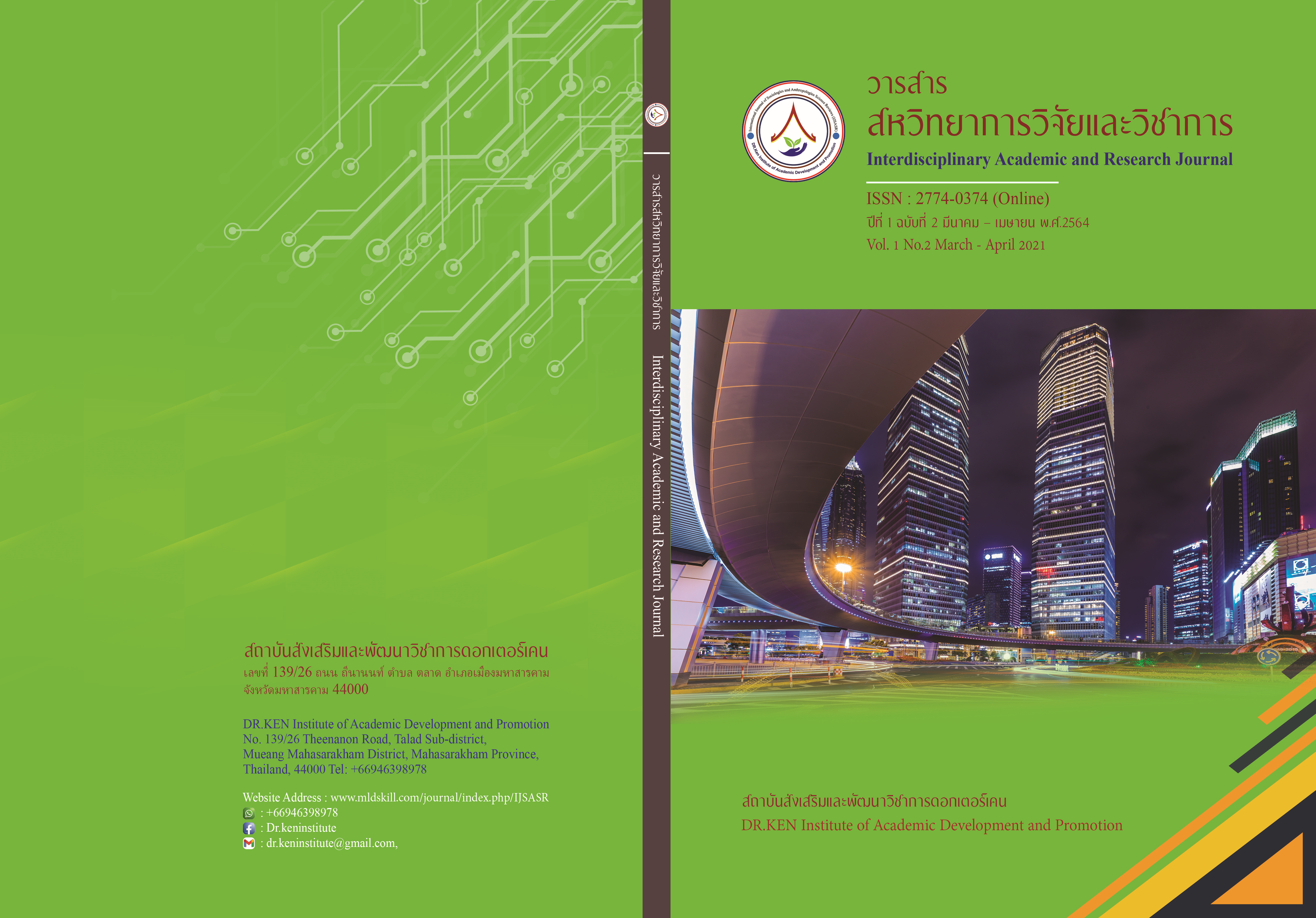Evolution and Trends of Democracy in Thailand
DOI:
https://doi.org/10.14456/iarj.2021.10Keywords:
Evolution and Trends ; Democracy in ThailandAbstract
A study on the evolution and trends of democratic governance in Thailand. After the change in Thai politics and government from 1932 to the present 2021, it can be seen that there has been a continuous improvement in the management of democratic governance. The evolution and trend of Thai government The study group saw that One thing that has to happen is a true democracy. "Upgrading" for a better future and a government that will bring people's well-being and happiness, as well as the application of democratic principles in the future. At present, there is a measure to check the balance of power and the use of administrative power. Political parties must be strong, ethical, and have good governance, regardless of their interests and power. Don't act like a capitalist and not a special party there must be a form of government that is solidarity, good governance, emphasizing peace, and supports democratic citizenship. which at present the citizen is a new generation There is also an awakening and more digital must pay attention to the participation of the people as much as possible thus creating a democratic culture and decentralization to the foundations will become a developed country and are on par with other civilized countries Keep up with the changes of the era.
References
กัญจิรา วิจิตรวัชรารักษ์. (2563). การเมืองการปกครองไทย. กรุงเทพมหานคร : J. Print 94.
เกษฎา ผาทอง. (2560). ระเบียบวิธีวิจัยทางรัฐศาสตร์ : แนวคิดทฤษฎีสู่การปฏิบัติ. (พิมพ์ครั้งที่ 2). ปทุมธานี : ศูนย์เรียนรู้การผลิตและจัดการธุรกิจสิ่งพิมพ์ดิจิตอล.
จรูญ สุภาพ, (2538), ลัทธิการเมืองและเศรษฐกิจเปรียบเทียบ. (พิมพ์ครั้งที่ 5), กรุงเทพมหานคร : สำนักพิมพ์ไทยวัฒนาพานิช.
ชรินทร์ สันประเสริฐ. (2538). ระบบการเมืองการปกครองในมนุษย์กับสังคม, เอกสารการสอนชุดวิชา. นนทบุรี : สำนักพิมพ์มหาวิทยาลัยสุโขทัยธรรมาธิราช.
ถวิลวดี บุรีกุล. (2564). สถาบันพระปกเกล้าจัดสัมมนาออนไลน์ ส่องอนาคตการเมืองไทยเพื่อประชาธิปไตยที่ยั่งยืน. [Online] สืบค้นเมื่อ 30 มิถุนายน 2564 จาก https://www.kpi.ac.th/news/gallery/data/1096
ทวี ทองสว่าง และคณะ. (2546). การเมืองการปกครองของไทย. กรุงเทพฯ : สำนักพิมพ์ศูนย์ส่งเสริมวิชาการ.
นิเวศน์ เหมวชิรวรากร, (2563). อนาคตของประเทศไทย. [Online] สืบค้นเมื่อ 30 มิถุนายน 2564จาก https://blog.settrade.com//blog/nivate/2020/10/19/2402
พรศักดิ์ ผ่องแผ้ว. (2524). รัฐศาสตร์ พัฒนาการและแนวการศึกษา. กรุงเทพฯ : โรงพิมพ์ศรีอนันต์.
พระพรหมคุณาภรณ์ (ป.อ. ปยุตฺโต). (2538). นิติศาสตร์แนวพุทธ. (พิมพ์ครั้งที่ 3). กรุงเทพฯ: บริษัท สหธรรมิก จำกัด.
พุทธทาสภิกขุ. (2521). “ธรรมสัจจะของธรรมชาติกับอุดมคติทางการเมือง” ธรรมสัจจสงเคราะห์ (ธรรมโฆษณ์). กรุงเทพมหานคร: ธรรมทานมูลนิธิ.
เยาวภา ประคองศิลป์. (2552). ประวัติศาสตร์การเมืองการปกครองไทย. กรุงเทพฯ : โรงพิมพ์เดือนตุลา.
ราชกิจจานุเบกษา. (6 เมษายน 2560). รัฐธรรมนูญแห่งราชอาณาจักรไทย พุทธศักราช 2560. เล่ม 134 ตอนที่ 40 ก, หน้า 14-17.
ลิขิต ธีรเวคิน. (2563). อนาคตการเมืองไทยและระบอบปกครองประชาธิปไตย. วารสารสถาบันพระปกเกล้า (สถาบันพระปกเกล้า), 4 (3), 1-12.
วัลลภ พิริยวรรธนะ, (1 ตุลาคม 2560), การเมืองการปกครองไทย. [Online] สืบค้นเมื่อ 28 มิถุนายน 2564 จาก http://www.elcim.ssru.ac.th/walloppi/pluginfile.php/182/block_html/content.
วิเชียร พงษ์ไพบูลย์. (2552). ศึกษาเปรียบเทียบแนวคิดทางการเมืองของพุทธทาสภิขุกับพระพรหมคุณาภรณ์ (ป.อ.ปยุตฺโต). วิทยานิพนธ์พุทธศาสตรมหาบัณฑิต สาขาวิชาพระพุทธศาสนา. มหาวิทยาลัยมหาจุฬาลงกรณมหาวิทยาลัย.
สุขุม นวลสกุล และวิศิษย์ ทวีเศรษฐ. (2541). การเมืองการปกครองไทย. กรุงเทพฯ : สำนักพิมพ์มหาวิทยาลัยรามคำแหง.
Taweesak Kanyachai (2020). พัฒนาการการปกครองไทย (สุโขทัย-ปัจจุบัน). [Online] สืบค้นเมื่อ 28 มิถุนายน 2564 จาก https://http://www.satit.up.ac.th/BBC07/AroundTheWorld/ pol/ 60.htm
Downloads
Published
How to Cite
Issue
Section
License
Copyright (c) 2021 Interdisciplinary Academic and Research Journal ISSN 2774-0373 (Online)

This work is licensed under a Creative Commons Attribution-NonCommercial-NoDerivatives 4.0 International License.
Copyright on any article in the Interdisciplinary Academic and Research Journal is retained by the author(s) under the under the Creative Commons Attribution-NonCommercial-NoDerivatives 4.0 International License. Permission to use text, content, images, etc. of publication. Any user to read, download, copy, distribute, print, search, or link to the full texts of articles, crawl them for indexing, pass them as data to software, or use them for any other lawful purpose. But do not use it for commercial use or with the intent to benefit any business.
















.png)


